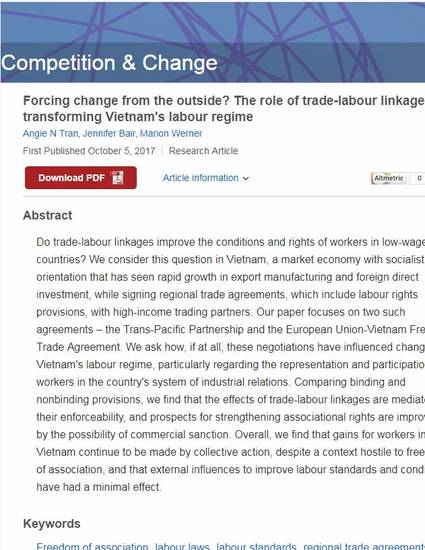
Article
Forcing Change from the Outside? The Role of Trade-Labour Linkages in Transforming Vietnam’s Labour Regime
Competition & Change
(2017)
Abstract
Do trade-labour linkages improve the conditions and rights of workers in low-wage countries? We
consider this question in Vietnam, a market economy with socialist orientation that has seen rapid
growth in export manufacturing and foreign direct investment, while signing regional trade agreements,
which include labour rights provisions, with high-income trading partners. Our paper focuses on two
such agreements – the Trans-Pacific Partnership and the European Union-Vietnam Free Trade
Agreement. We ask how, if at all, these negotiations have influenced changes in Vietnam’s labour
regime, particularly regarding the representation and participation of workers in the country’s
system of industrial relations. Comparing binding and nonbinding provisions, we find that the effects
of trade-labour linkages are mediated by their enforceability, and prospects for strengthening associational
rights are improved by the possibility of commercial sanction. Overall, we find that gains for
workers in Vietnam continue to be made by collective action, despite a context hostile to freedom of
association, and that external influences to improve labour standards and conditions have had a minimal
effect.
Keywords
- Freedom of association,
- labour laws,
- labour standards,
- regional trade agreements,
- trade-labour linkage,
- Vietnam
Disciplines
Publication Date
October, 2017
DOI
10.1177/1024529417729326
Citation Information
Angie Tran, Jennifer Bair and Marion Werner. "Forcing Change from the Outside? The Role of Trade-Labour Linkages in Transforming Vietnam’s Labour Regime" Competition & Change Vol. 21 Iss. 5 (2017) Available at: http://works.bepress.com/angie-tran/8/
